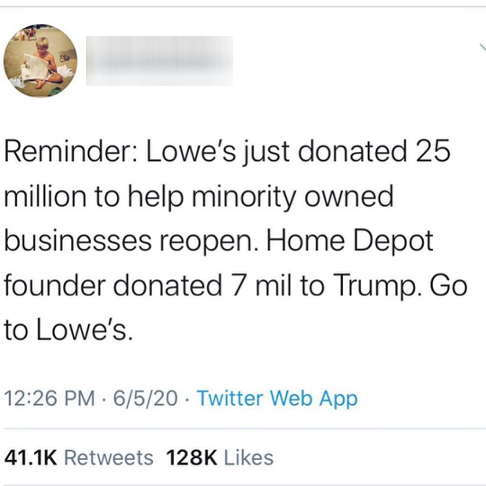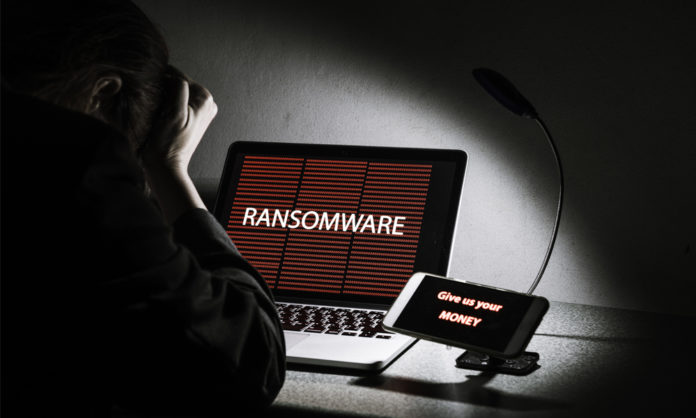Twitter is a fun and easy way to engage with pop culture and maybe even spark a spirited discussion. Many of us on twitter can retweet/share without thinking or researching what tweets truly say, causing them to spread quickly to a larger audience. But, the sad fact is, some tweets might end up being misinformation or disinformation, especially politically-oriented tweets.
In this day and age, when it seems everybody is trying to influence your vote, it’s important to dig just below the surface when it comes to Twitter. First, so you know the facts behind the tweet and second, so you yourself don’t become guilty of spreading misinformation or disinformation.
Take for example the following tweet:

It’s obviously a popular tweet, retweeted over 41,000 times since it was posted on the 5th of June 2020. With over 128,000 likes, that’s a lot of attention for a politically-oriented tweet.
The tweet implies the reader should boycott Home Depot, a popular do-it-yourself home-improvement supplier apparently supporting Donald Trump in the 2020 election cycle, in favor of Lowe’s, which appears to be a benefactor of minority-owned businesses. The statement “Lowe’s just donated” implies the donation came in late May or early June. “Home Depot founder donated” similarly sounds like it happened recently, within the past few days or weeks.
Both things stated here are correct, but their juxtaposition in this tweet functions as misinformation. A little research - through a quick Google search, no less - shines a light on the facts.
- Fact: Lowe’s created a $25 million grant program to assist small businesses owned or led by minorities or women in late May 2020.
- Fact: In mid-July 2020, Lowe’s added $5 million to the grants meant for minority/women owned/led small businesses and added another $25 million for small businesses in rural communities. Because this tweet was posted in early June, there’s no way the poster could have known this, so their figure of $25 million was correct at the time of the post.
- Fact: Home Depot founder Bernie Marcus donated $7 million to Trump’s campaign in the 2016 election cycle. His donations to the 2020 campaign have not been made public yet, but Marcus has stated he will continue to support Trump in 2020.
Marcus retired from his position as Home Depot’s CEO in 2002. Nothing he does since then represents the company, so mentioning the founder of Home Depot in the context of this tweet serves as misinformation. It is fundamentally true that he donated $7 million to the Trump campaign, but it had nothing to do with Home Depot. Just like any individual, Marcus is free to donate to whomever he likes. Unlike most individuals, he has amassed a fortune because he founded an incredibly successful company, from which he was able to comfortably retire nearly two decades ago.
Political action committees run by both companies donate to both parties.
- Fact: LOWPAC is the political action committee (PAC) run by Lowe’s.
- In the 2016 election cycle, LOWPAC donated $448,750 to candidates for federal offices; they put 87%, or $390,412.50, of those donations towards Republican candidates. The remaining 13% ($58,337.50) went to Democrat candidates.
- In the 2018 (midterm) election cycle, LOWPAC’s donations totaled $602,000; 75% went to Republican candidates.
- So far in the 2020 election cycle, LOWPAC has donated $564,000; 68% to Republican candidates.
- Fact: The Home Depot Inc. Political Action Committee is the PAC run by Home Depot.
- In the 2016 election cycle, THDIPAC donated $1,977,250 to candidates for federal offices; they put 70%, or $1,384,075, of those donations towards Republican candidates. The remaining 30% ($593,175) went to Democrat candidates.
- In the 2018 (midterm) election cycle, THDIPAC’s donations totaled $2,060,500;. 63% went to Republican candidates.
- So far in the 2020 election cycle, THDIPAC has donated $1,565,000; 56% to Republicans.
Based on these figures, both PACs - and therefore both companies from a corporate giving standpoint - overwhelmingly supported Republican candidates in the 2016 and 2018 election cycles. So far in the 2020 election cycle, Lowe’s has continued to favor Republican candidates by a wide margin (68% R to 32% D), while Home Depot has a more even distribution of its PAC funds (56% R to 44% D).
In this light, this tweet’s attempt to shame readers into boycotting or at least avoiding Home Depot in favor of Lowe’s easily qualifies as misinformation.
Knowing Lowe’s - through LISC - has increased their grant funding for small businesses, primarily those in rural areas or owned/led by minorities or women, makes the data in the initial post inaccurate. Tweets can last a long time, reposted and shared across platforms for weeks or months and even brought up again years after they were initially posted. The data in them can easily be incorrect, which functions as another form of misinformation.
No matter your personal political leanings or beliefs, it is important to view all such tweets with a bit of skepticism. Undertaking a minimum of research into the information in tweets such as this one can quickly uncover misinformation, whether it is intentional or simply a function of time.
Notes & Sources
- LISC = Local Initiatives Support Corporation. Established in 1979 by the Ford Foundation, a private foundation started by Edsel and Henry Ford in 1936 to promote human welfare and well-being.
- “Lowe’s-LISC Partnership.” https://www.lisc.org/covid-19/small-business-assistance/small-business-relief-grants/lowes/
- Washburn, Kaitlin. “What Trump’s major donors are spending in the midterms,” 30 October 2018. https://www.opensecrets.org/news/2018/10/what-trumps-major-donors-are-spending-in-the-midterms/
- Biographical information on Bernard “Bernie” Marcus, https://en.wikipedia.org/wiki/Bernard_Marcus
- Election cycle PAC donations information taken from the Center for Responsive Politics, opensecrets.org






